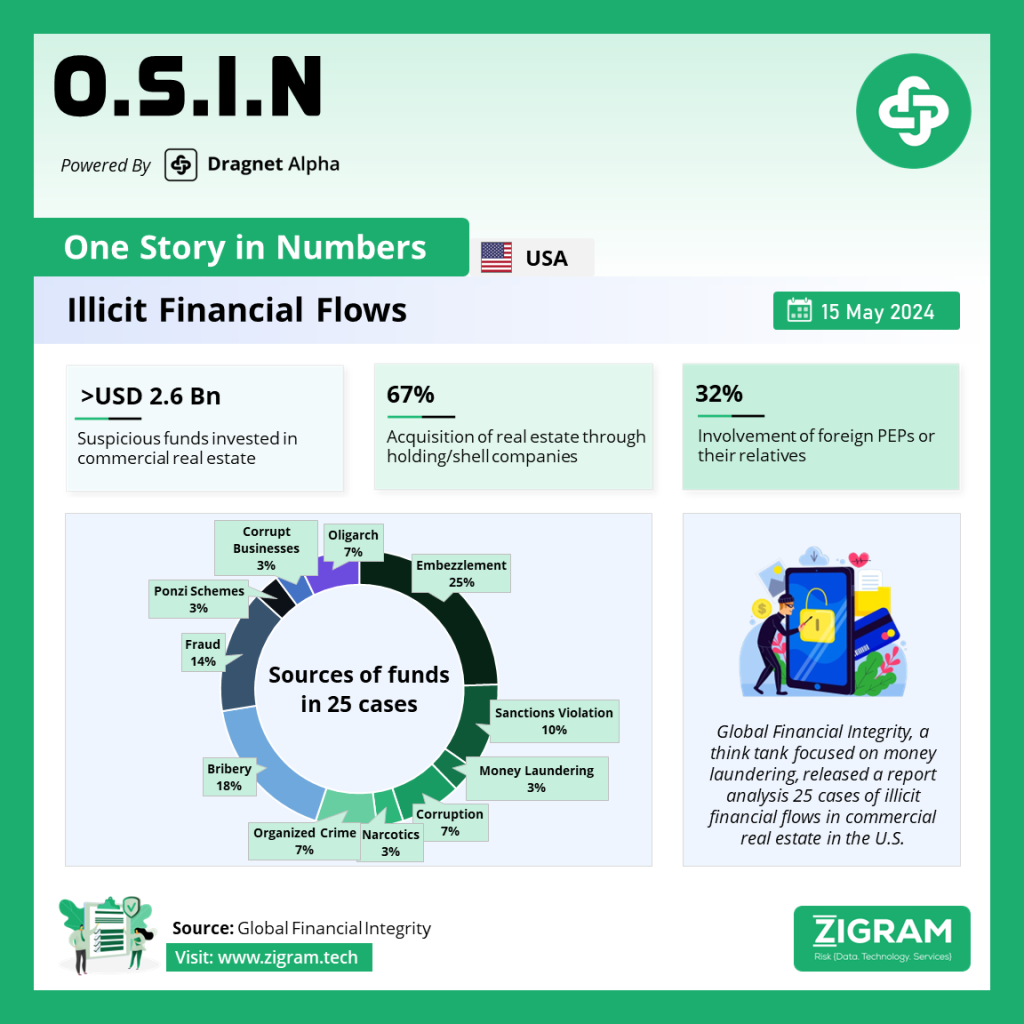Published Date:
Global Financial Integrity, in collaboration with the FACT Coalition and the Anti-Corruption Data Collective, has released a damning report highlighting the significant influx of illicit funds into the U.S. commercial real estate market. Over the past two decades, 25 cases involving suspicious financial activity have been identified, with illegal investments amounting to over USD 2.6 billion. These funds have found their way into properties across 20 states, with California, Florida, and New York emerging as the most favored destinations.
The Global Reach of Illicit Investments
The report uncovers that the origins of these suspicious funds are as diverse as their destinations. Sources include 14 countries such as Iran, North Korea, Kazakhstan, Russia, and Mexico. This global influx underscores the widespread appeal of U.S. commercial real estate for those seeking to launder money. The properties involved are varied, ranging from hotels, shopping malls, and supermarkets to a music studio and an equestrian facility, in addition to typical office high-rises.
Politically Exposed Persons and Oligarchs
A startling revelation from the report is that eight out of the 25 cases involve foreign government officials or their relatives, classified as Politically Exposed Persons (PEPs). These connections were often discovered long after the property purchases, highlighting the opacity surrounding such transactions. Russian oligarchs, in particular, have been noted for investing in U.S. real estate to circumvent international sanctions.
The Challenge of Transparency
The complexity of financing schemes and the lack of transparency in commercial real estate transactions create an environment ripe for money laundering. Identifying the true owners behind these purchases is particularly challenging due to the involvement of real estate investment trusts, private investment groups, and shell companies operated by proxies, registered agents, and attorneys.
Key Findings
The report’s key findings paint a concerning picture:
– Over USD 2.6 billion in suspicious funds were invested in U.S. commercial real estate across 22 states over the past 20 years, with the actual figure likely being much higher.
– These funds originated from 14 countries, including Russia (four cases), Mexico (four cases), China, Malaysia, Iran, and Kazakhstan.
– Of the 25 cases reviewed, 14 involved politically exposed persons or oligarchs with close ties to foreign government officials.
– The types of properties involved include land/buildings, business facilities (e.g., music studios, health facilities), retail spaces (e.g., supermarkets, hotels), and industrial sites (e.g., steel plants).
– Weak or non-existent reporting requirements by professions involved in the purchase of commercial real estate facilitated the laundering of illicit funds.
Recommendations for Reform
To combat this issue, the report recommends several measures to enhance transparency and accountability in U.S. commercial real estate transactions:
1. Enhanced Reporting Obligations: FinCEN should mandate reporting requirements for multiple real estate professionals, ensuring at least one U.S.-based entity involved in the transaction from both the buyer and seller is accountable. Attorneys, who are legally required to be part of the closing process in almost 20 states, should be included with specific reference to their role in the transaction.
2. Coverage of Ownership Transfers: Current regulations only refer to purchases of real property by a legal entity. FinCEN should expand these rules to cover direct or indirect transfers of ownership and the creation of equitable interest in the property without an actual sale.
3. Inclusion of Trust Transactions: A significant portion of housing is now owned by trusts, which are often excluded from the Corporate Transparency Act. FinCEN should include transactions by all classes of legal entities and arrangements, including trusts, in any new regulations.
The report by Global Financial Integrity, the FACT Coalition, and the Anti-Corruption Data Collective underscores the urgent need for regulatory reforms to address the laundering of illicit funds through U.S. commercial real estate. By implementing stringent reporting requirements and expanding the scope of covered transactions, authorities can make significant strides in curbing this pervasive issue. As the findings suggest, the current state of affairs offers criminal syndicates, cartels, kleptocrats, and fraudsters a relatively easy path to hide their ill-gotten gains, a situation that must be rectified to protect the integrity of the U.S. financial system.
Read the full press release and download the report here.
- #MoneyLaundering
- #IllicitFunds
- #RealEstateFraud
- #AntiCorruption
- #FinancialIntegrity
- #FACTCoalition
- #Transparency
- #CommercialRealEstate
- #GlobalFinance
- #FinCEN
- #Kleptocracy
- #DirtyMoney
- #RealEstateTransparency
- #FinancialReform
- #AML
- #ShellCompanies
- #PoliticallyExposedPersons
- #USRealEstate
- #FinancialCrime
- #EndMoneyLaundering
